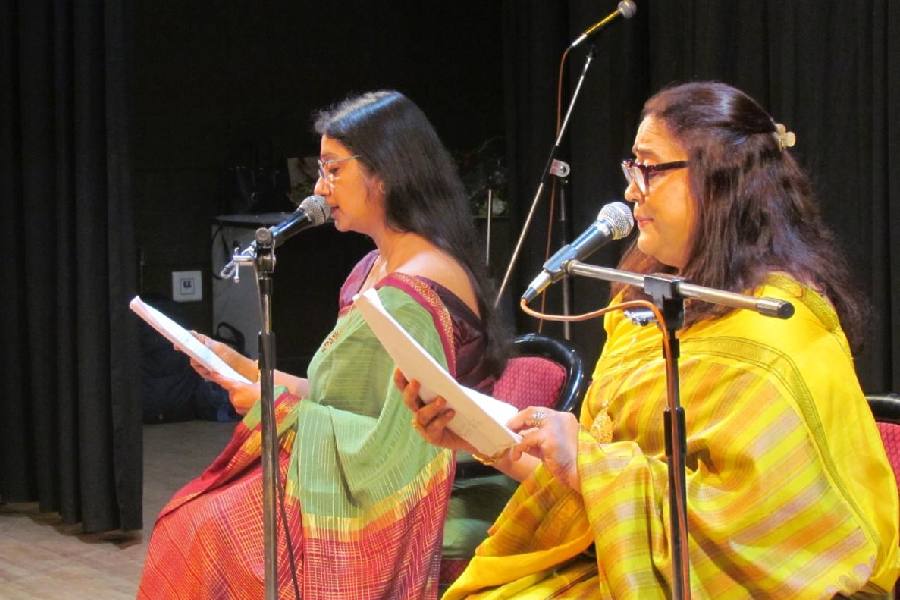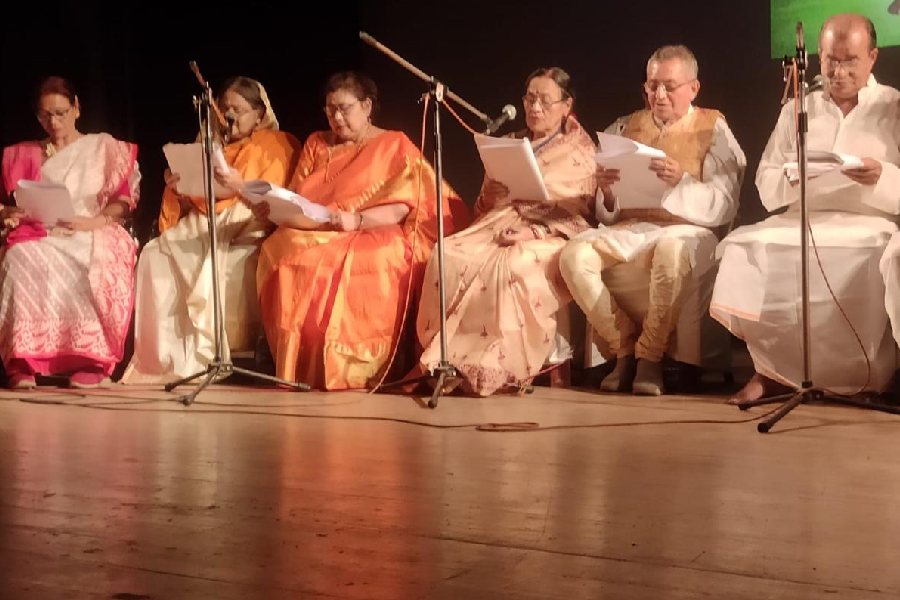When Madhuram, an FD Block-based cultural group, celebrated its 15-year journey at Rabindra Okakura Bhavan, they felicitated a number of people who have associated with them down the years. Most of them had decades of experience but one was barely two decades old himself.
Shreyan De, a Class X student, took the stage alongside social worker Pradip Sengupta, physician Partha Chatterjee, philanthropist Goutam Das, actor and veteran members Kalpana Mukherjee and Kalyani Bose.
The boy is not only an actor but also a percussionist, painter, and national archery champion. A rank holder in school, he said he keeps himself updated through newspapers and his mother's cell phone. “Without a personal cellphone, I am no less advanced than my friends. Rather, I find more time for valuable activities. My passion is playing the tabla,” said the Kendriya Vidyalaya 1 student.
Also feted was president of Madhuram, Dipak Sarkar. “Drawing inspiration from Sri Ramakrishna’s belief that people learn valuable lessons through theatre, I had embarked on this journey 15 years ago. I started writing scripts, directing, and acting,” said secretary Manika Mukherjee, who also trains students in theatre at Sri Sathya Sai Bal Vihar School in BG Block and Behala.
And then began the plays. The first audio drama, Sonali Godhuli, revolved around a new concept of adopting elderly individuals from old age homes. IT sector employee Raghav and his wife are expecting a child but they are both orphans. Enthused by the joyful atmosphere at a senior citizens’ home, they ask to adopt a set of grandparents to shower their baby with love.
Madhuram's second audio drama, Rani Rashmoni o Maa Bhabatarini, was both written and directed by Mukherjee. It took the audience to the banks of the Hooghly of yesteryears when Rani Rashmoni revealed the dream she had while leaving for Varanasi. In the dream, Ma Bhabatarini instructs her to build the temple in Dakshineswar.
“I felt blessed to be enacting such a historical character,” said Sanghamitra Ghatak, who has been acting since the age of three. “Despite having had no formal education, Rani Rashmoni was an able woman and an embodiment of humanity,” she said.
The concluding drama was by a new township-based group called Kalpataru. Gadhabazar was a satirical comedy about two young frustrated, unemployed men who con a farmer into buying a man by convincing him that it is a donkey that has turned into one. The foolish peasant takes the man home and faces the wrath of his sensible wife.
“Theatre is my passion but playing this character was a challenge as this woman is ompletely unlike us, urban folk,” said Ipshita Ganguly, who played the peasant’s wife. “The dialogues were strong and interesting and I got to learn a new dialect used by the people of living in our border areas,” said the chartered accountant.
Words’ worth
The annual show by Kathay Kathay, an EC Block-based centre for elocution and drama, presented a bouquet of items that entertained and conveyed social messages.
"The pursuit of perfection has transformed members of this group into true artistes," said elocutionist Kajal Sur, who was felicitated at the show.
The performances then began with recitation by 12 children aged between five and seven years. They had come from Kestopur-based group Annyo Swapno and were applauded for reciting a collage of Kazi Nazrul Islam's poems. “Most of these kids are underprivileged but we train and involve them. Nine out of 35 of them have been selected by All India Radio as child artists," smiled Puspita Mitra, who directed the show.

The Kathay Kathay show at Rabindra Okakura Bhavan. The Telegraph
Next was an audio drama Bibaha Sthir performed by Sur and Somali Chatterjee. It was based on a difficult conversation between an engaged couple.
Hosts Kathay Kathay presented three audio plays and member Shaswati Bhattacharjee recited two popular poems by Sunil Gangyopadhyay.
The first audio play Honeymoon o Ekta Aloukik Dhwas was about mysterious happenings around a newlywed couple visiting a hill. The second audio play Anamni Angana was based on the birth of Vidura from The Mahabharata. The concluding audio drama presented was Dhananjoy Ghosal's Jege thakar Swapno.
"Our group was formed by students of Jagannath and Urmimala Basu," said secretary of Kathay Kathay, Sunita Banerjee. "Our motto today was to entertain and convey messages, especially in our last play that was on reviving our dreams and caring for the aged.”
Kallol Ghosh, figurehead of the township-based group Sanglap, presented an audio drama based on Tagore’s Karna Kunti Sambad, written by Mithila Banerjee, that offered a fresh perspective.
He also presented Mastermashay, that highlighted the plight of some sections of society even as we celebrate Durga puja with grandeur. For instance, needy children miss out on mid-day meals since schools are shut.
